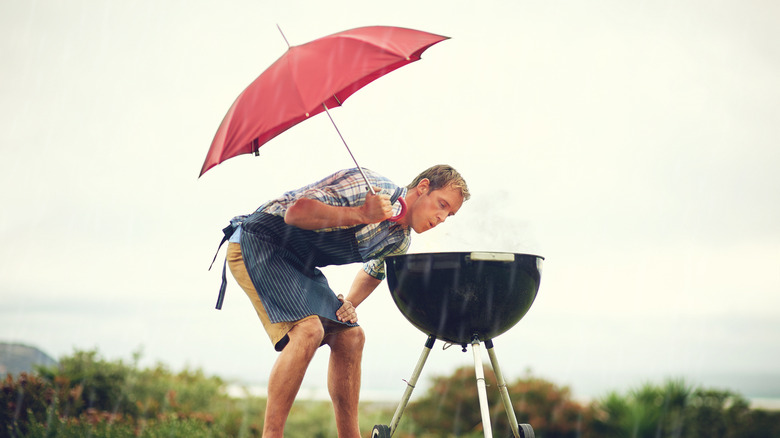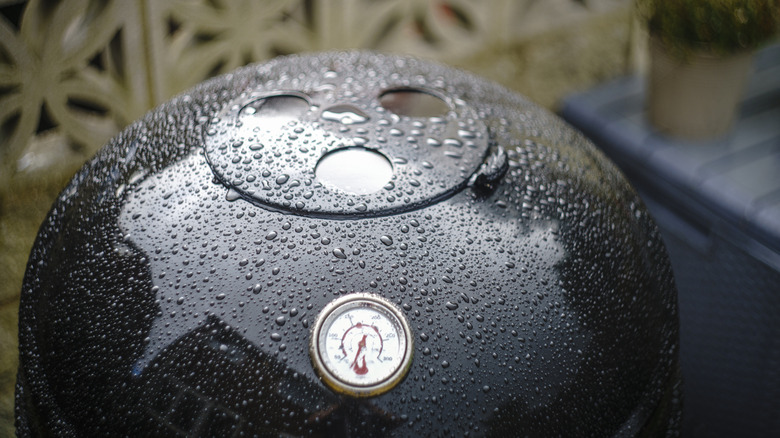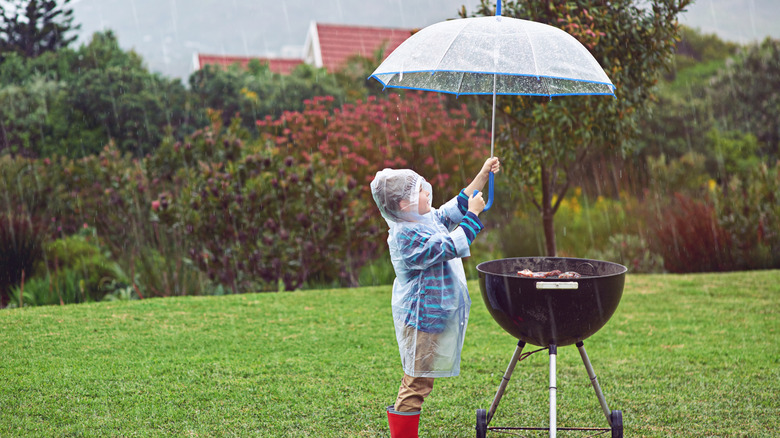How To Grill Effectively When It's Raining
There's nothing like the disappointment when you've been looking forward to grilling dinner, only to find that, when the time comes, it's raining. Should you abandon all hope and just order pizza? No way, according to Nicole Johnson, owner, photographer, and recipe developer at Or Whatever You Do! "Grilling in the rain is very possible with the right setup," she told Food Republic. "The biggest challenges are maintaining heat and preventing water from interfering with cooking."
"We like to put the grill under a canopy, a pop-up tent with high clearance, or a covered porch, if available," she continued. But, Johnson emphasized, for your safety, it's important that whatever you choose to grill under has proper ventilation. If too much smoke builds up, instead of just smoky-smelling clothes, you could have a medical emergency on your hands.
Since wind often goes hand-in-hand with rain, Johnson also touts the use of a windscreen; you could also set up a tarp. In either case, though, you do have to be careful that it's sturdy and secure enough to not get blown away (or worse, topple into the grill, or you). She also recommended forgoing man-made structures and "placing the grill in a naturally shielded spot," to help it keep its heat.
Starting and maintaining your grill in the rain
Getting your grill to actually start is a different beast when you're grilling in the rain. "If using charcoal, a chimney starter is a must, and keeping fuel dry is critical — wet charcoal won't burn properly," said Nicole Johnson. In the ongoing debate over which is preferable, gas or charcoal grills, though Bobby Flay is firmly Team Charcoal, this is an instance where the former takes the cake. "Gas grills are generally more reliable in wet conditions, as they heat quickly and maintain consistent temperatures, but ensuring the burners are shielded from moisture is important," said Johnson.
As for pellet grills, like the Big Green Egg, they "... work well as long as the hopper stays dry, with some models automatically adjusting for temperature drops," Johnson noted. Above all, though, no matter which type of grill you're using, when it's raining you'll want to keep the lid closed as much as possible, she emphasized. This will keep the heat consistent not only by limiting the amount of water droplets that touch the surface (thereby reducing the likelihood that your flames will go out), but also by keeping out the cooler air that tends to accompany rain.
Adjusting your expectations for grill cook times
If you plan on not letting it rain on your parade, er, grill, then you should also be aware that it might take you longer to get everything cooked than it would if you were grilling under a sunny sky. "Cooking in wet conditions often requires some adjustments," Nicole Johnson said. "Preheating should take longer to compensate for heat loss from rain, and internal temperatures should be monitored closely with a probe thermometer, as external weather conditions can affect consistency."
When your meats (and sturdy, char-worthy vegetables) hit the grates, you should prepare to devote a little extra time to grilling. "Increased humidity can lead to longer cook times," Johnson explained, "especially for foods that need browning or crisping." Grilling in the rain, then, isn't ideal if you're in a hurry, which is why it's important to do so under a canopy or tent — so you won't feel rushed every time a droplet of water pings your skin.
Finally, Johnson recommended keeping extra fuel on hand, especially if you're already running low. It's "... a good idea since maintaining high heat in the rain may require more charcoal or pellets," she said.



